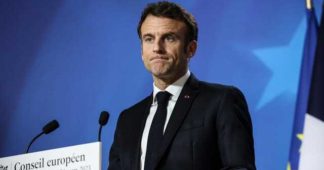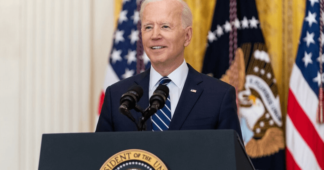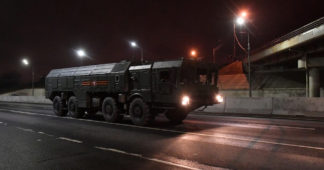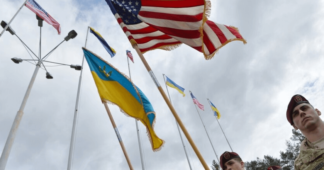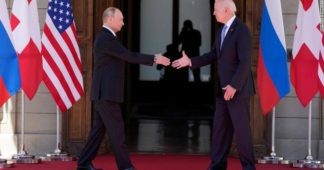Putin Threatens To Use Nukes as NATO Continues Sabre Rattling
Hawkish rhetoric has been emanating from NATO capitals, including hints of deploying alliance troops to Ukraine
March 13, 2024
Moscow will use nuclear weapons if Russia perceives an existential threat to its independence or sovereignty, President Vladimir Putin reaffirmed on Wednesday. This comes amid a spate of provocative rhetoric in NATO capitals, including discussions regarding deploying alliance troops to Ukraine.
During an interview with Russian state television, Putin said the Kremlin is prepared to resort to nuclear weapons use if there is a threat to “the existence of the Russian state, our sovereignty and independence.” He continued, “All that is written in our strategy, we haven’t changed it.”
The Russian leader was asked if he ever considered using tactical battlefield nuclear weapons in Ukraine, but he said that has not been necessary. Putin explained he does not believe the world is heading for nuclear war. Rather, he feels that Joe Biden, his American counterpart, is a veteran politician who comprehends the dire risks of any escalation that would reach such a threshold.
However, Putin did address the hawkish remarks made by NATO officials and even heads of state recently, saying “the nations that say they have no red lines regarding Russia should realize that Russia won’t have any red lines regarding them either.”
Gabrielius Landsbergis, Lithuania’s top diplomat, embraced French President Emmanuel Macron’s recent remarks that “nothing can be ruled out” regarding the deployment of NATO troops to Ukraine. “Now is the right time to discuss this,” Landsbergis enthused. “Starting this conversation erases the red lines we have imposed on ourselves,” he added.
Likewise, Polish Foreign Minister Radek Sikorski confirmed the presence of NATO troops in Ukraine last Friday during an event celebrating Warsaw’s 25-year membership with the alliance. “NATO soldiers are already present in Ukraine. And I would like to thank the ambassadors of those countries who have taken that risk.”
The head of the German Air Force along with other officers were caught on a leaked tape acknowledging the presence of British troops in the embattled country, where those forces are helping Ukrainian forces fire the Storm Shadow missiles London has provided. The UK confirmed a week earlier that “a small number” of British troops are on the ground “supporting the armed forces of Ukraine.”
The officers also discussed plans to provide Taurus missiles to Kyiv, weapons which have a range of roughly 300 miles, in hopes of carrying out attacks against Russia. The Kremlin responded by saying this “makes it clear that plans to carry out strikes inside Russia are under discussion.”
Following Macron’s inflammatory comments, Putin addressed the Federal Assembly and made clear “[our] strategic nuclear forces are on full combat alert, and the ability to use them is assured.”
He went further, pointing to the possibility of nuclear attacks on NATO states, emphasizing “Now they have started talking about the possibility of deploying NATO military contingents to Ukraine… They must grasp that we also have weapons – yes, they know this, as I have just said – capable of striking targets on their territory.”
Putin highlighted Kyiv’s failing war effort and said Washington as well as Ukraine’s other Western backers will have to negotiate a deal to end the war on terms Russia finds acceptable. “It shouldn’t be a break for the enemy to rearm, but a serious talk involving the guarantees of security for the Russian Federation.”
In 2022, former German chancellor Angela Merkel and other officials suggested that the Berlin and Paris brokered Minsk Accords, which were agreed to by Ukraine and Russia and backed by the US and UN, were secretly meant to “give Ukraine time” to build up a formidable military for a war with Russia. The accords were intended to resolve the civil war in Ukraine following the US-backed 2014 coup in Kyiv which ultimately led to Russia’s invasion eight years later.
Reuters reported on Wednesday that the Kremlin made efforts at the end of 2023 and the beginning of this year to reach a ceasefire deal with the US. But Washington once again rejected a diplomatic option.
In April 2022, Russia and Ukraine agreed on a tentative peace agreement, which culminated in a draft treaty that could have ended the war. The White House, London, and Brussels refused the deal. Former British Prime Minister Boris Johnson, representing the “collective West,” told Ukrainian President Volodymyr Zelensky not to negotiate so NATO could use the opportunity to bleed Russia in a protracted conflict.
The goal of the proxy war is to “weaken” Russia militarily, Pentagon chief Lloyd Austin revealed shortly thereafter. Since then, the project has failed. Western weapons stocks have dried up, Russia’s artillery production has significantly outstripped the entire NATO alliance, Kyiv lost control of a fifth of its territory, and half a million Ukrainian soldiers have been killed or seriously injured.
* Connor Freeman is the assistant editor and a writer at the Libertarian Institute, primarily covering foreign policy. He is a co-host on the Conflicts of Interest podcast. His writing has been featured in media outlets such as Antiwar.com, Counterpunch, and the Ron Paul Institute for Peace and Prosperity. He has also appeared on Liberty Weekly, Around the Empire, and Parallax Views. You can follow him on Twitter @FreemansMind96.
We remind our readers that publication of articles on our site does not mean that we agree with what is written. Our policy is to publish anything which we consider of interest, so as to assist our readers in forming their opinions. Sometimes we even publish articles with which we totally disagree, since we believe it is important for our readers to be informed on as wide a spectrum of views as possible.
